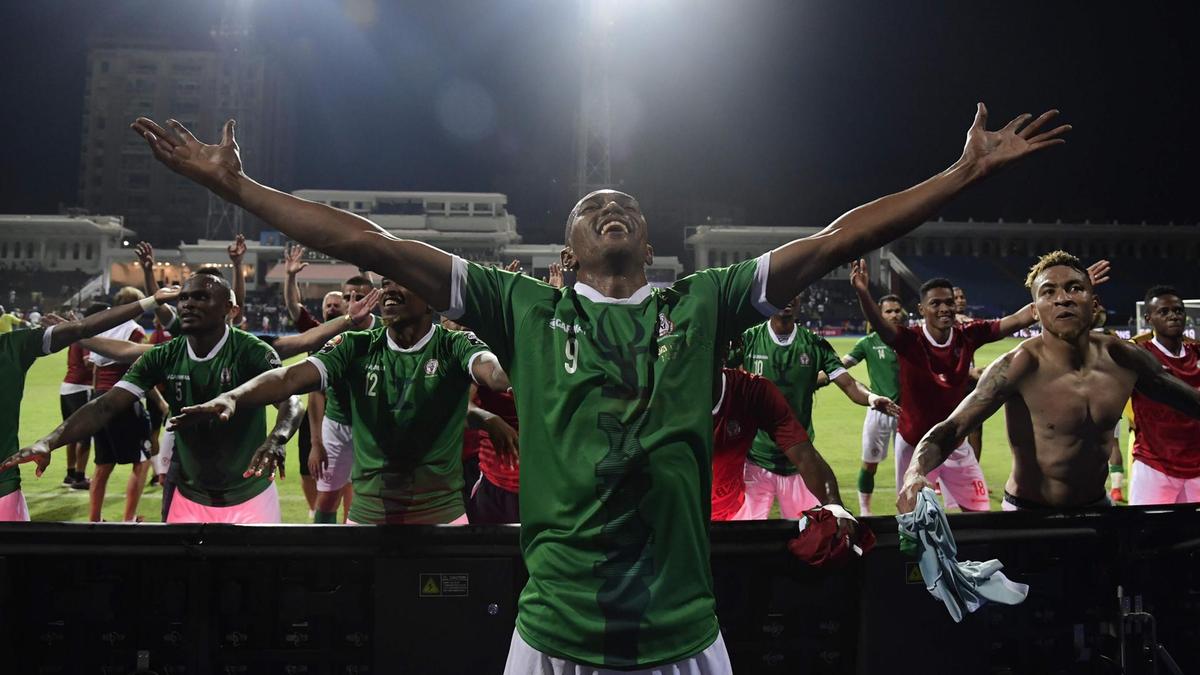The longest journey to this, the most extended, inclusive Africa Cup of Nations begins on islands.
They have long been the marginal onlookers of the continent’s football, and to look at the footnotes of the 2019 tournament is to be reminded. When the draw for qualifying was arranged, eight unlucky nations, the worst ranked in Africa, were ordered into play-offs for the right even to enter the group stage; four were offshore minnows.
Among them, tiny Sao Tome e Principe, of the Atlantic, and the Comoros and Mauritius of the Indian Ocean. Plus the big land mass with the minuscule football pedigree that is Madagascar.
The Malagasies got the long haul trip, a two-legged tie with Sao Tome, and the away leg hardly evoked confidence that this qualifying campaign would break Madagascar’s run of never having reached an Afcon finals. They won 1-0 thanks only to an own goal; in the return they cut it fine, too, edging to 3-2 after a scare in the last 10 minutes.
That was in early 2017, when a win over an archipelago with a population less than one hundredth the size of theirs (Sao Tome: less than 200,000; Madagascar: more than 22 million) was still cause for celebration and Madagascar were still lingering outside the top 100 of the Fifa rankings.

Fast forward to Cairo on Thursday, and there is a scarcely credible scenario: Madagascar’s footballers stand 90 minutes from a Cup of Nations semi-final, in this their first voyage to the tournament’s finals. They must beat Tunisia, five times at World Cups, to get there.
The first thing Tunisia – who have drawn all their matches so far and edged past Ghana on penalties in the last 16 – will know is that they should not bank on another shootout to impose their hierarchy on the so-called minnows. Four cool, immaculate Malagasy spot-kicks broke the nerves of DR Congo on Sunday to swing a quarter-final where Congo had twice come back, in the 90th minutes, from behind.
Little, it seems, can ruffle these intrepid islanders, whose wins over Burundi and Nigeria – a stunning 2-0 against the Super Eagles – put them top of their group. The 2019 Afcon had found in this squad of polysyllabic surnames its underdog heroes.

Players like Carolus Andriamatsinoro, the striker with the dyed-blond hair and clever darting runs; the speedy winger, Lalaina Nomenjanahary; and Faneva Andriatsima, the 35-year-old captain, whose goal against the Congolese edged the islanders closer to their improbable quarter-final and whose deep appreciation of the vividly joyous reactions at home is clear.
“The most important thing about this is to bring happiness to the people in Madagascar,” he said.
Andriatsima, who plays for Clermont, in the second tier of French club football, has served the national team for 14 years, which gives him a clear perspective on how far Madagascar’s so-called Zebus – a type of cattle, hence the mimicking of horns to celebrate goals – have come.
Significantly, he also gave his blessing to the idea that the Federation should become more proactive in seeking out Madagascan-heritage players abroad, mainly in France, to strengthen the pool of resources. Club football on the island is cash-starved and, in terms of pan-African competitions, weak.
So a number of players born and raised as French citizens will be in the XI who take on Tunisia, including perhaps the whole back four, if veteran defender Jeremy Morel, of Lyon, is fit to line up alongside the Stade de Reims centre-half Thomas Fontaine.
That pair are recent call-ups, players with Madagascan parents who were persuaded to lend their Ligue 1 experience to the cause.
A French coach, Nicolas Dupuis, has been in charge since 2016. Just before he signed up, he watched, via his computer in France, a dispiriting 6-1 home defeat of Madagascar by DR Congo in the qualifiers for the 2017 Cup of Nations.
Much has changed since then.
The Congolese players who lost, via shootout, to Madagascar in Alexandria, noted how few of the personnel they recognised from that thrashing, and evidently, how far standards had risen.
Dupuis, who combines this job with managing FC Fleury in the fourth tier of French football, believes they can rise still further. He knows his team have been careless at times, and sometimes ridden their luck. He was critical of the quarter-final display.
“We didn’t play our best but I can see a team giving everything of ourselves,” he said, “and with a huge desire to go on further. They want to make the people of Madagascar happy.
“They know it’s gone crazy with celebrations back at home.”
























